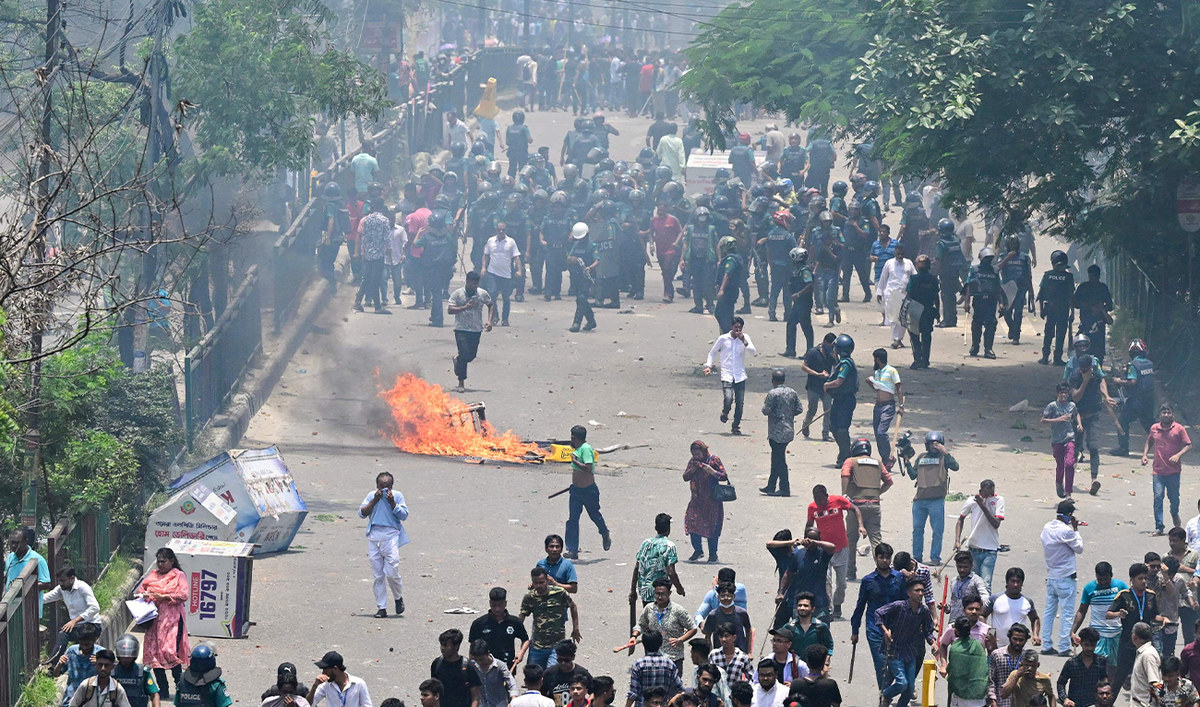Dhaka: Bangladesh woke Friday to survey destruction left by the deadliest day of ongoing student protests so far, which saw government buildings torched by demonstrators and a nationwide internet blackout put into effect.
This week's unrest has killed at least 39 people including 32 on Thursday, with the toll expected to rise further after reports of clashes in nearly half of the country's 64 districts.
A police statement issued after a near-total shutdown of the nation's internet said protesters had torched, vandalised and carried out "destructive activities" on numerous police and government offices.
Among them was the Dhaka headquarters of state broadcaster Bangladesh Television, which remains offline after hundreds of incensed students stormed the premises and set fire to a building.
"About 100 policemen were injured in the clashes yesterday," Faruk Hossain, a spokesman for the capital's police force, told AFP. "Around 50 police booths were burnt".

Anti-quota protesters clash with the police in Dhaka on July 18, 2024. (AFP)
The police statement said that if the destruction continued, they would "be forced to make maximum use of law".
Police fire was the cause of at least two-thirds of deaths reported so far, based on descriptions given to AFP by hospital staff.
At least 26 districts around the country reported clashes on Thursday, broadcaster Independent Television reported.
The network said more than 700 had been wounded through the day including 104 police officers and 30 journalists.
Near-daily marches this month have called for an end to a quota system that reserves more than half of civil service posts for specific groups, including children of veterans from the country's 1971 liberation war against Pakistan.
Critics say the scheme benefits children of pro-government groups that back Prime Minister Sheikh Hasina, 76, who has ruled the country since 2009 and won her fourth consecutive election in January after a vote without genuine opposition.
Hasina's government is accused by rights groups of misusing state institutions to entrench its hold on power and stamp out dissent, including by the extrajudicial killing of opposition activists.
Her administration this week ordered schools and universities to close indefinitely as police step up efforts to bring the deteriorating law and order situation under control.
Mubashar Hasan, a Bangladesh expert at the University of Oslo in Norway, told AFP Thursday that the protests had grown into a wider expression of discontent with Hasina's autocratic rule.
"They are protesting against the repressive nature of the state," he told AFP. "The students are in fact calling her a dictator."
Students have vowed to continue their campaign despite Hasina giving a national address on the now-offline state broadcaster seeking to calm the situation.
"Our first demand is that the prime minister must apologise to us," protester Bidisha Rimjhim, 18, told AFP on Thursday.
"Secondly, justice must be ensured for our killed brothers," she added.
London-based watchdog Netblocks said Friday that a "nation-scale" internet shutdown remained in effect.
"The disruption prevents families from contacting each other and stifles efforts to document human rights violations," it wrote in a social media post on X.























